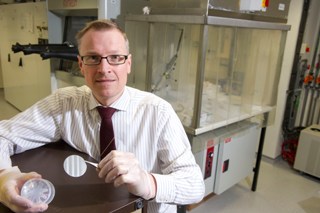Apr 3 2015
Tyndall National Institute has partnered with US and Northern Irish research institutes to secure €1 million in funding to develop new ways of harnessing converted electricity. The Nano-GaN Power Electronic Devices project has the potential to have a global impact across the entire power electronics industry.
 Prof. Peter Parbrook, Stokes Professor of Nitride Materials & Devices at Tyndall National Institute displaying a wafer of perfect sapphire crystal on which Gallium Nitride has been grown. His research will look to stabilise the material so it can be used to convert energy more efficiently, saving up to 25% of the power currently lost.
Prof. Peter Parbrook, Stokes Professor of Nitride Materials & Devices at Tyndall National Institute displaying a wafer of perfect sapphire crystal on which Gallium Nitride has been grown. His research will look to stabilise the material so it can be used to convert energy more efficiently, saving up to 25% of the power currently lost.
The Nano-GaN Power Electronic Devices project will seek to improve the efficiency of converting electrical power by up to 25%. This would represent a huge financial saving to the consumer and could substantially reduce global carbon emissions. This issue is of immense importance to all the countries involved in this research, with Ireland in particular importing nearly 90pc of its energy, leaving it very perceptible to changes in the international markets.
Working with a substance called Gallium Nitride, frequently used in LED lightbulbs and space satellites, the collaborators from Tyndall National Institute, Cork, Illinois Institute of Technology and Queens University Belfast, will look to stabilise the material so it can be used to convert high voltages to more manageable levels, without the current high energy losses. The new technology is expected to be particularly impactful on the development of electric and hybrid vehicles.
Commenting on the announcement, Prof Peter Parbrook, Stokes Professor of Nitride Materials & Devices at Tyndall National Institute stated: “This will be the first time nanostructures using Gallium Nitride will be used for power electronics. We will attempt to bend out the material’s defects, making it more stable and hence more reliable in the conversion process. It has the potential to produce significant energy saving efficiencies that will benefit people in the home and at work.”
Nano-GaN is funded through the US-Ireland R&D Partnership Programme, a single-proposal, single-review mechanism, which supports tri-jurisdictional projects. The project will employ four new post-doctorate positions across the three partners.
The US-Ireland Collaborative Research on Nano-GaN Power Electronic Devices (GaNnano) will be led by Prof Peter Parbrook and Anne-Marie Kelleher in Tyndall; Prof. John Shen at the Illinois Institute of Technology; and Dr Miryam Arredondo-Arechavala of Queens University Belfast.